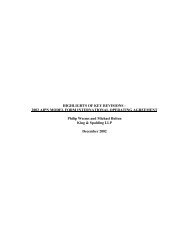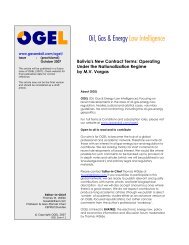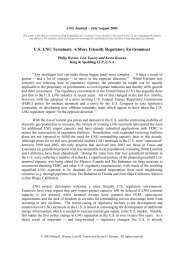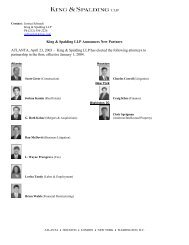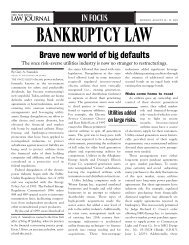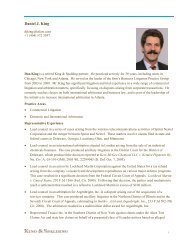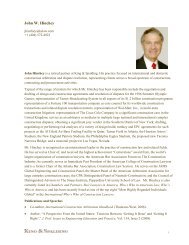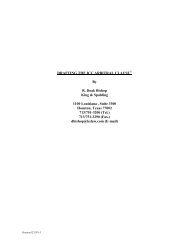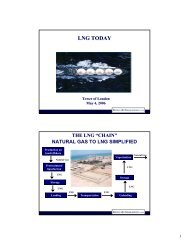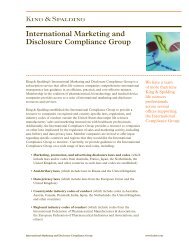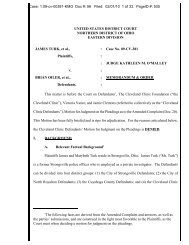Due Diligence Review: M&A Behind the Scenes - King & Spalding
Due Diligence Review: M&A Behind the Scenes - King & Spalding
Due Diligence Review: M&A Behind the Scenes - King & Spalding
You also want an ePaper? Increase the reach of your titles
YUMPU automatically turns print PDFs into web optimized ePapers that Google loves.
LEGALduediligence<br />
sive sales or distribution territories, it is important to know your<br />
own contractual constraints when embarking on an acquisition or<br />
joint venture with a company in <strong>the</strong> same industry. Inadvertently<br />
acquiring a company with overlapping exclusive territories can<br />
jeopardise <strong>the</strong> success of an acquisition.<br />
A thorough due diligence investigation brings toge<strong>the</strong>r professionals<br />
from a number of different disciplines. In addition to<br />
business and corporate diligence efforts, among o<strong>the</strong>r areas, specialists<br />
are often brought in to review benefits, labour, environmental,<br />
tax, and accounting matters. Fur<strong>the</strong>r, if <strong>the</strong> transaction<br />
involves multiple countries, <strong>the</strong> number of professionals in each<br />
of <strong>the</strong>se areas can be multiplied by <strong>the</strong> number of jurisdictions.<br />
Consequently, effective coordination of <strong>the</strong> due diligence team is<br />
essential. It is typically <strong>the</strong> role of outside counsel to coordinate<br />
this process. It is imperative that an efficient reporting structure<br />
is created so that information is delivered to <strong>the</strong> decision makers<br />
in a consistent manner. The use of "e-rooms" has been a popular<br />
new tool to aid in <strong>the</strong> coordination process. It is equally important,<br />
however, that <strong>the</strong> decision makers are not overburdened<br />
with information that is not useful to <strong>the</strong>m. This is, of course, <strong>the</strong><br />
purpose behind <strong>the</strong> diligence team understanding <strong>the</strong> business<br />
objectives of <strong>the</strong> transaction and <strong>the</strong> diligence review.<br />
The effective transfer of information to <strong>the</strong> proper decision<br />
makers is extremely important from a liability perspective as<br />
well. For example, in some circumstances under US case law,<br />
information that has been provided to a diligence team can result<br />
in a waiver of an indemnity claim subsequent to <strong>the</strong> acquisition<br />
even if <strong>the</strong> information in question was not mentioned anywhere<br />
in <strong>the</strong> acquisition agreement or schedules.<br />
On <strong>the</strong> o<strong>the</strong>r side of <strong>the</strong> diligence equation, targets need to prepare<br />
<strong>the</strong>mselves for <strong>the</strong> diligence exercise as well. Since acquiring<br />
companies are under a greater degree of scrutiny with respect<br />
to <strong>the</strong>ir transactions, <strong>the</strong>y are going to put an ever greater burden<br />
on targets to provide information in <strong>the</strong> due diligence process.<br />
This concept is true both in <strong>the</strong> US and in Europe. From a target’s<br />
point of view, due diligence can be time consuming and burdensome.<br />
This is often exacerbated by targets taking <strong>the</strong><br />
understandable position of wanting to let as few people know<br />
about <strong>the</strong> potential transaction as possible in order to avoid leaks<br />
and disruption. While in certain instances targets can successfully<br />
keep potential suitors at bay with respect to diligence efforts,<br />
it is often <strong>the</strong> case that thorough investigations result in a better<br />
purchase price because <strong>the</strong> risk of <strong>the</strong> unknown is reduced. In<br />
fact, some major corporations simply will not proceed with a<br />
transaction unless <strong>the</strong>y are allowed sufficiently full access in <strong>the</strong><br />
diligence process. Fur<strong>the</strong>rmore, allowing a thorough diligence<br />
review can result in shorter indemnity/claims periods and lower<br />
caps.<br />
The focus of due diligence changes with each transaction and<br />
by industry, but <strong>the</strong>re are a number of hot topics that receive a<br />
great deal of attention. Not surprisingly, <strong>the</strong>se are areas where <strong>the</strong><br />
largest potential liabilities are often found. These areas typically<br />
include: environmental; labour; pensions and benefits; export<br />
control matters; and restrictions on operations/non-competition<br />
agreements.<br />
The question is frequently asked whe<strong>the</strong>r purchasing representation<br />
and warranty insurance can take <strong>the</strong> place of conducting a<br />
thorough diligence investigation. There are some excellent insurance<br />
products available, and <strong>the</strong>y can be extremely useful in<br />
bridging gaps in indemnities contained in purchase agreements.<br />
However, insurance is not a replacement for due diligence. Broad<br />
insurance can often be prohibitively expensive for a number of<br />
transactions. Our experience has been that insurance is <strong>the</strong> most<br />
cost effective and best used for targeted areas in certain specified<br />
limited circumstances. In addition, although policies vary, many<br />
insurance policies will not insure unknown risks or only insure<br />
certain types unknown risks targeted in particular categories. For<br />
example, often environmental insurance policies will only insure<br />
against losses arising out of matters identified in an environmental<br />
audit, but will not insure against unidentified liabilities.<br />
As a final matter, it is important to understand what <strong>the</strong> purchase<br />
agreement says about due diligence findings and how <strong>the</strong>se<br />
finding affect indemnities and closing conditions. There are a<br />
variety of ways diligence investigations can be handled in a purchase<br />
agreement. On one extreme, <strong>the</strong> agreement can state that<br />
all information learned during due diligence is held against <strong>the</strong><br />
purchaser. In o<strong>the</strong>r words, anything <strong>the</strong> purchaser knows about<br />
<strong>the</strong> target prior to signing can not be used as <strong>the</strong> subject of a claim<br />
or to prevent <strong>the</strong> closing. This is often referred to as an "antisandbagging"<br />
provision. A recent High Court decision in England<br />
has held that pre-signing knowledge by a buyer’s accountants,<br />
even though such knowledge was not passed on to <strong>the</strong> buyer,<br />
acted to preclude a breach of warranty claim in <strong>the</strong> context of a<br />
purchase agreement that contained anti-sandbagging language.<br />
On <strong>the</strong> o<strong>the</strong>r end of <strong>the</strong> spectrum, some agreements include provisions<br />
that state that <strong>the</strong> only knowledge that <strong>the</strong> purchaser is<br />
deemed to have about <strong>the</strong> target is included in <strong>the</strong> purchase agreement<br />
and its schedules. To complicate <strong>the</strong> matter fur<strong>the</strong>r, in transactions<br />
where <strong>the</strong> signing of <strong>the</strong> purchase agreement is prior to<br />
<strong>the</strong> actual completion of <strong>the</strong> acquisition, information learned<br />
prior to signing is often treated differently than information<br />
learned between signing and completion. In addition to <strong>the</strong> agreement<br />
in <strong>the</strong> contract, in certain jurisdictions, <strong>the</strong> law can override<br />
or supplement <strong>the</strong>se provisions. For example, many US attorneys<br />
take <strong>the</strong> position that, based on certain relatively recent<br />
court decisions, <strong>the</strong> safer approach is always to assume that presigning<br />
knowledge may potentially void a breach of warranty<br />
claim despite any language in <strong>the</strong> contract to <strong>the</strong> contrary.<br />
Consequently, it is important for <strong>the</strong> diligence team to be in contact<br />
with <strong>the</strong> negotiating team to be sure that everyone understands<br />
<strong>the</strong> consequences of <strong>the</strong> diligence investigation and how it<br />
relates to <strong>the</strong> overall agreement.<br />
Often overlooked or put aside, diligence is an excellent way to<br />
impress a client, but, conversely, a poor result is one of <strong>the</strong> best<br />
ways to disappoint <strong>the</strong>m. If something is missed, consequences<br />
can be devastating, but if done correctly, it can result in a<br />
smooth transition of ownership and help ensure a successful<br />
transaction.<br />
John Keffer and Mark E. Thompson are partners at <strong>King</strong> & <strong>Spalding</strong> LLP.<br />
12 FW <strong>Due</strong> <strong>Diligence</strong> <strong>Review</strong>: M&A <strong>Behind</strong> <strong>the</strong> <strong>Scenes</strong> 2004 | www.financierworldwide.com



